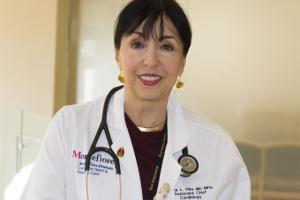
Description
When she was just 7, Amanda Jamieson, Ph.D., loved peering at pond water samples under a microscope. Over the years, her fascination with living systems only grew, and today, Jamieson – now an assistant professor of molecular microbiology and immunology at Brown University –studies how the body’s airways, lungs, and skin respond to injury and infection.
Perhaps not surprisingly, her biggest focus in recent months has been on the body's reaction to COVID-19. Specifically, she and the 12 researchers working in her lab have been looking at how the lungs respond to SARS-CoV-2, the virus that causes the disease.
"When the lab was temporarily shut down in March 2020, one thing we could do is look at existing data sets," Jamieson explained. The researchers homed in on patients hospitalized with COVID-19, and they concluded that blood clotting, a hallmark of the disease, could start in the lungs. The team is now following patients with lingering symptoms to classify the virus' long-term effects.
It's all part of Jamieson's effort to understand disease processes so that potential therapies can be developed. For example, she is working with a company to test how a bacteria-capturing ink it created might prohibit the virus from spreading within air-filtration systems or on surfaces, such as medical gloves and equipment.
Jamieson is also focused on better understanding how the immune system responds when there’s more than one inflammation-triggering insult to the body at the same time – such as when a patient is dealing with pneumonia and recovering from surgery. She is forging partnerships with surgeons, medical engineers, and other researchers studying not only the lungs, but also the brain. This had led to new projects, including one exploring how the brain and circulatory system may influence the body’s reaction to infection.
Before the pandemic, Jamieson's lab studied a myriad of immune responses. One research topic they are studying now, supported by the National Heart, Lung, and Blood Institute, examines how different immune cells – including macrophages and natural killer (NK) cells – help the body respond to lung damage, and how bacteria living in the lungs may affect this process.
Studying how the body responds singularly, synergistically, and symbiotically to infection is a central theme throughout Jamieson's research.
"Many of my research directions have come from exciting, serendipitous discoveries and collaborations," added Jamieson. "I think that is how some of the best discoveries are made."
Learn more about Amanda Jamieson
Professional Page
Publications
Related Links
How the lungs work
Respiratory failure
COVID-19 and the lungs
The lung microbiome



